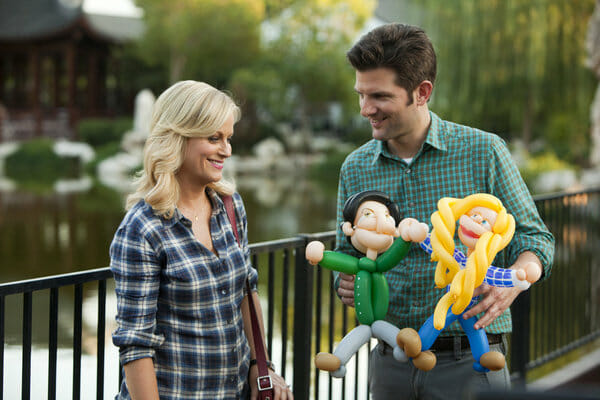
Old-fashioned sitcoms always needed to return things to status quo at the end of every episode because there was a good chance that whoever watched the episode had missed one of the last few. If someone’s just flipping through, it’s alienating for them not to know exactly who the characters are and what their situation is, so television tended to cater to that. While The Office and Arrested Development played a big role in making TV comedies more continuity-based, I’ve long felt that it was The Sopranos that acted as the main catalyst in this category, too. Parks and Recreation is also structured around a dysfunctional family and is rarely concerned with catching its audience up with latest developments.
I’m not sure exactly what someone new to the show, or one who just intermittently catches Parks, would think about last night’s episode. My feeling is that it would seem weird and kind of aggressive. All three of its stories rely on what we know of these characters’ pasts in order to function, but that makes them more rewarding for those of us who watch the show every week. Parks never forgets its own history. I’ve written before about the way it’s made Pawnee into a sort of live-action Springfield, but in a way it’s created something greater than that because Pawnee and its characters grow while Springfield will always remain the same.
I couldn’t help but think of the show’s differences with The Simpsons, either, because Eagleton has always been Pawnee’s Shelbyville, the town next door that locals hate. However, Pawneeans have a good reason to hate their neighbors, since it’s a town filled with the stereotypes of rich jerks. The ideal Pawnee citizen would of course be Leslie, the woman who does her best to help everyone and works 80 hours a week. In contrast, Eagleton seems filled with the rich and idle, hanging around their country with pastel sweaters draped over their necks.
So Leslie’s feud with the city is cartoonish, but only so much so. While her rage at the altruistic park designer is misplaced (he made a Li’l Sebastian fountain!), her rage at Eagleton and what it represents is far less so. They are the Tea Party, and even for Indiana that country club looked, as Leslie said, frightening, which is to say frightening in its lack of diversity. Fortunately, all’s well for them at the end of the episode, and the park is one step closer to getting made.
Going on in the background of Leslie and Ben’s negotiations are the last (for now) adventures of Bert Macklin, as he hunts down Miss Hitler. It’s a short, poignant story about Andy needing to grow up, which is probably the most inscrutable thing to outsiders in the episode. I found it strangely moving, because Andy’s immaturity is something wonderful to behold. It’s also a lot of why April fell in love with him, because he’s a kid who’d rather play games than take the world seriously. This had to happen eventually, but it was still sad to see him leave.
In the episode’s B-plot, Tom enlisted his friends in setting up Rent-a-Swag, which he cheaps out on. His reaction to Entertainment 720 may be a little heavy-handed, but it’s perfectly fitting for Tom, who does nothing in half measures. What’s also great about Rent-a-Swag is that like other ventures in the show, there seems to be plenty of room for failure. Despite having what may be a good idea and some decent follow-through, we don’t know from the outset that he will succeed. It’s this season’s version of Leslie’s campaign for office, the story we have to hope works out well but understand, like Tom, that this isn’t a show like that. It’s optimistic, but most importantly, it’s able to find optimism in failure and defeat and disappointment. Andy discarding Bert was moving because it was both happy and sad. We know that it’s what’s best for him, but we’re still sorry to leave this part of him behind. Ultimately, that’s what I think new viewers miss out on the most. The jokes are clear in Parks, regardless of when you jump in, but the emotions are built on the foundation of dozens of episodes, and they’re what makes the show truly great.
Stray observations:
•”A strong gentleman who fights crime nocturnally.” – That’s what the bat-man does. Batman, on the other hand, is a superhero.
•Jazz + Jazz = Jazz is something so stupid that I found myself surprised no one had actually done it before.
•”An entire town claimed they weren’t home.”
•I’m always happy when The Many Surrenders of Pawnee gets another mention.
•”Where’s the necklace with all of Germany’s war secrets?”
•Andy and April’s relationship seems to be increasingly roleplaying based. I probably shouldn’t find this as awesome as I do.
•Speaking of Simpsons similarities, Chris’s log is very similar to The Simpsons “made it from a better spoon” joke. I like the way this offhanded mention set up a story for another episode.
•”If there were more food and fewer people, this would be a perfect party.” – I’m with Ron.
•”They call their boogers Pawnee caviar.”
•”Thank you for saving me, Andy. Thank you, too, Miss Hitler.”
•”I never even met my family.” – Bert Macklin at his finest.
•”I hate all of this, which probably means it’s good for your business.”